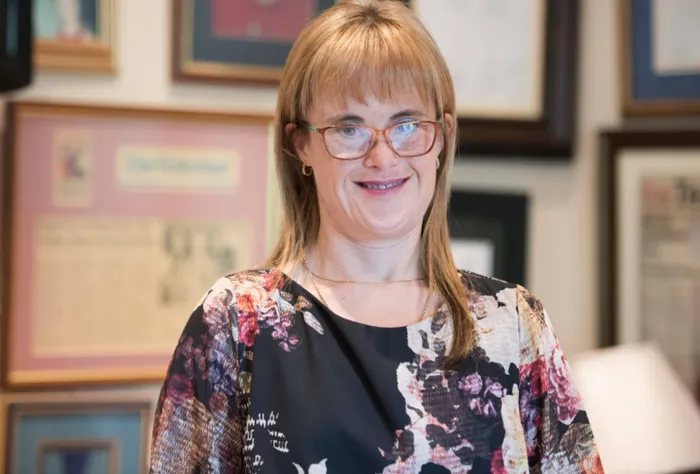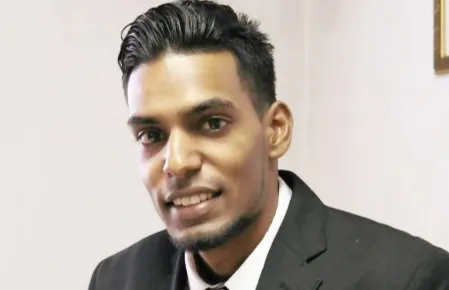
Shéri Brynard is the only person with Down syndrome who has a tertiary teacher's diploma
Image: Beautiful News South Africa
TODAY South Africa observes National Down Syndrome Day, a day established by President Nelson Mandela to affirm that every person, regardless of chromosome count, is owed dignity, opportunity, and belonging.
This is not a ritual for ribbon-cutting but a call to action: will we continue to relegate those with intellectual disabilities to the margins, or will we heed Mandela’s lesson that “only 50 years ago persons with intellectual disabilities were scorned, isolated and neglected. Today, they are able to attend school, become employed and assimilate into their local community”?
Down syndrome is not an illness or a curse. It is simply a genetic condition caused by an extra chromosome. Yet stigma has long cloaked this community in shame. It is time to strip that away and celebrate their strength, beauty, and potential. One in every 500 births in South Africa is affected by Down syndrome - these are our children, siblings, and colleagues.
Inclusion starts with attitude: seeing the person before the disability, celebrating abilities and dreams.
This year, Down Syndrome South Africa (DSSA) is amplifying the voices of self-advocates under themes like Empower Me, Embrace Me, Include Me, Accept Me. These are calls to action: to empower with education, to include in schools and workplaces, to accept as full citizens. When we do, we enrich our society and uphold the dignity our Constitution promises.
One shining example is Shéri Brynard, South Africa’s only teacher with Down syndrome to earn a tertiary diploma. She teaches pre-school children with special needs and travels the world as a motivational speaker.
“I am one of them and I am happy to be who I am,” she says of her pupils. Her life proves that given love and support, children with Down syndrome grow into accomplished, confident adults. Stories like Shéri’s must be told widely so that parents of children with Down syndrome hear not despair, but hope. An estimated 500 000 children with disabilities in South Africa are not in school. Even when inclusive policies exist, implementation fails. Many children are left at the back of classrooms with little support. This is a national failure.
Early intervention is crucial: teaching and therapy must begin as soon as possible. We need investment in early childhood centers, training more therapists, and placing them in under-resourced communities. Teachers must be equipped to include pupils with Down syndrome through visual aids, flexible teaching methods, and patient guidance. Government must enforce inclusive education policies with real accountability. Why not establish an Inclusion Task Force to monitor schools and ensure no pupil is turned away?
Dr Makubalo has called for one-stop support hubs where health, education, and social services collaborate to help families. This model, common in other countries, could be piloted in each province so that children receive comprehensive care without bureaucratic delays. Inclusion must extend to higher education and vocational training. Europe has pioneered programs granting certificates to students with intellectual disabilities who complete adapted curricula. South African colleges could do the same, opening paths to employment in advocacy, art, IT, or entrepreneurship.
Adults with Down syndrome want what we all want the dignity of work, independence, and community. Yet it is rare to see them employed in supermarkets, offices, or restaurants - not because they cannot work, but because doors are closed. Initiatives like Cape Town’s Brownies & Downies café, where young adults with intellectual disabilities are trained and employed, prove that inclusion is possible and profitable.
Imagine if every major company in South Africa hired even a handful of workers with intellectual disabilities or sponsored internships and job training programs. Government could incentivise this through tax breaks and lead by example by hiring persons with Down syndrome into public service roles. Globally, we have seen people with Down syndrome become elected officials, entrepreneurs, and media personalities. South Africa should not lag behind.
Inclusion requires changing hearts and minds - and visibility is key. For too long, people with Down syndrome have been invisible or portrayed as objects of pity. That narrative is shifting. We now see models with Down syndrome on runways, actors in films, athletes completing marathons. Media should spotlight such achievements year-round, not just on Awareness Day.
Representation must include self-representation: “Nothing about us without us.”
DSSA’s National Self-Advocates Movement ensures that persons with Down syndrome speak for themselves. Their motto, “with us, not for us,” should guide every media panel, policy discussion, and community event.
National Down Syndrome Day should be a rallying point for a civil rights movement for persons with intellectual disabilities. Picture a future where a child born with Down syndrome receives quality early intervention, attends an inclusive school, accesses higher education, works in a company that values her, and lives independently. She sees people like herself in media and public office and knows she belongs. This future is possible if we invest in early education, enforce inclusive policies, incentivise employers, and shift social attitudes.
Each person empowered to learn and work becomes a contributor, lightening the load on families and enriching the nation. Inclusion is everyone’s job. Employers must partner with DSSA to create jobs and training opportunities. Policymakers must enforce and expand inclusive practices. Teachers must be advocate for resources and welcome pupils with disabilities. Media professionals must tell the success stories, not just the struggles. Citizens must speak out against prejudice, support fundraisers, join campaigns, and show kindness daily.
Above all, let us listen to people with Down syndrome themselves. Their dreams are no different from ours - they want love, purpose, and community. As one parent recently said, “I’m hoping that things will change for our kids in the future.” Hope is powerful, but action is urgent.
In Mandela’s words: “When we lift up the least heard among us, we lift up our country as a whole.”
The journey to inclusion is the journey to justice. Let us march forward, hand in hand, until no one is left behind.

Previn Vedan
Image: Supplied
Previn Vedan is a lawyer and human rights advocate
** The views expressed do not necessarily reflect the views of IOL or Independent Media.